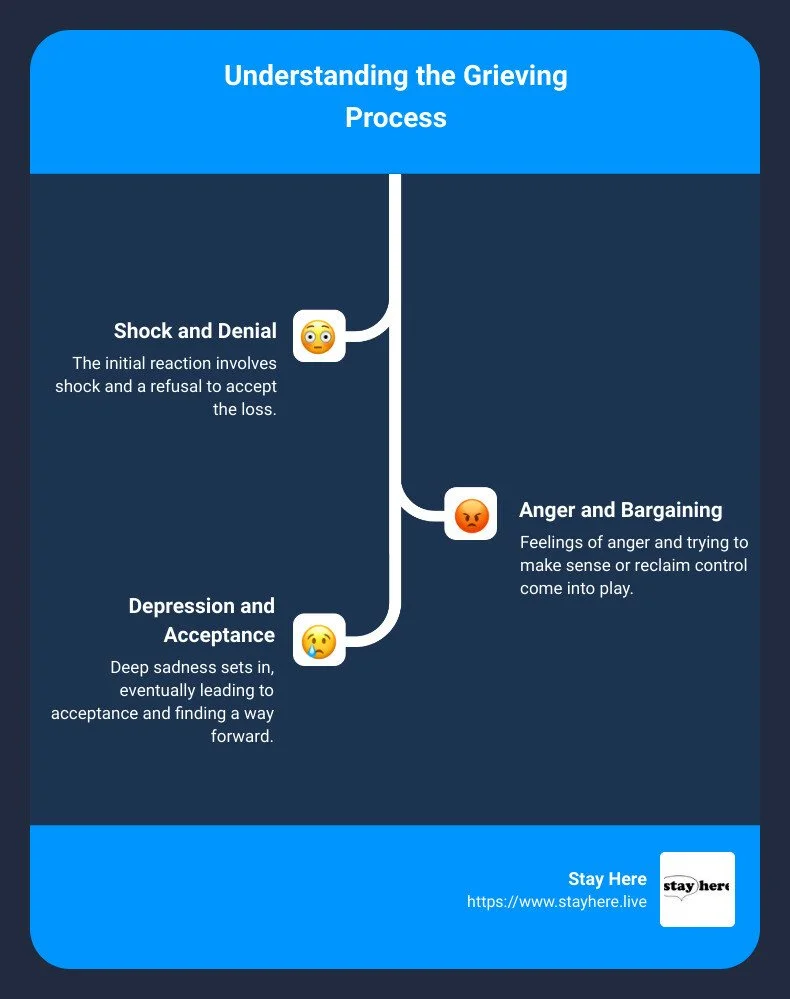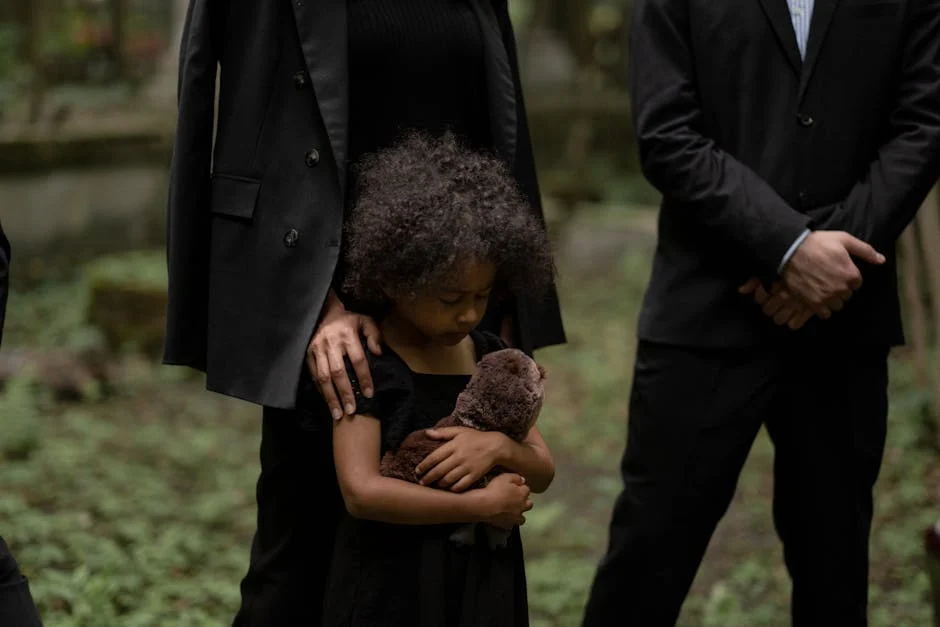What Does It Mean to Grieve? Exploring the Emotional Process
Image Alt Text: Sadness - define grieve
Exploring the Emotional Process of Grief
To define grieve, recognize that grief is a profound emotional response to loss. Whether mourning the death of someone close, the end of a significant relationship, or an abrupt life change, grief is a natural process that everyone experiences differently.
Grief: A natural response to loss.
Emotional response: Involves sadness, anger, and sometimes, peace.
Loss of someone close: Most commonly triggers grief.
Grief, as many describe, can hit you in waves. One minute, you might feel okay, and the next, you're overwhelmed with sadness or anger. This rollercoaster of emotions is completely normal and part of the healing journey.
I'm Jacob Coyne, a speaker and founder of Stay Here, dedicated to helping those struggling with mental health by offering hope and support. With years of experience in understanding how people define grieve, I aim to make this complex topic simple for anyone facing loss.
Image Alt Text: Breakdown of Grieving Process - define grieve infographic infographic-line-3-steps
Define Grieve: A Comprehensive Overview
Grief is a natural response to losing someone or something important to you. It's an emotion that everyone experiences at some point in their lives. Grieving is not just about feeling sad; it involves a range of emotions and reactions that can be overwhelming and confusing.
Intense Sadness
When you lose someone close, you often feel a deep, intense sadness. This sadness can be so strong that it feels like a physical pain. You might cry unexpectedly or feel a constant heaviness in your chest. This sadness is a normal part of grieving and is a way for your body and mind to process the loss.
Shock and Numbness
Initially, many people experience shock and numbness. This is your mind's way of protecting you from the full impact of the loss. You might feel like you're in a dream, or that what's happening isn't real. This feeling can last for a few days or even weeks. It's a temporary phase that helps you slowly come to terms with the reality of your loss.
Denial and Anger
Denial is another common reaction. You might find yourself thinking, "This can't be happening," or "There must be some mistake." Denial helps you cope with the initial shock by allowing you to gradually absorb the news.
As the reality of the situation sets in, anger often follows. You might feel angry at yourself, the person who died, or even at the world. This anger can be directed at anyone or anything, and it's a normal part of the grieving process. It's important to acknowledge these feelings rather than suppress them.
Image Alt Text: Grieving person - define grieve
Grieving is a journey that looks different for everyone. Recognizing these common reactions can help you understand that what you're feeling is normal and that you're not alone.
The Biblical Perspective on Grieving
The Bible offers a rich mix of emotions and teachings about grief. From divine indignation to heartfelt anguish, the scriptures provide guidance and comfort to those who are mourning.
Divine Indignation
In the Bible, grief is sometimes expressed through divine indignation. This is seen when God shows anger over sin and injustice. For example, in the book of Jeremiah, God grieves for the sinful actions of His people, demonstrating that even divine beings feel the pain of loss and wrongdoing.
"My heart is broken within me; all my bones tremble. I am like a drunken man, like a strong man overcome by wine, because of the Lord and his holy words." - Jeremiah 23:9
Heartfelt Anguish
Heartfelt anguish is another biblical response to grief. This deep, emotional pain is evident in the Psalms, where David often pours out his sorrow to God. His honest expressions of grief show that it’s okay to feel deep sadness and to seek solace in faith.
"My tears have been my food day and night, while people say to me all day long, ‘Where is your God?’" - Psalm 42:3
Judgment Against Sin
Sometimes, grief in the Bible is tied to judgment against sin. The story of King David and Bathsheba is a poignant example. When their child dies as a consequence of David's sins, it highlights the profound sorrow that can come from realizing one's mistakes.
"Then David said to Nathan, 'I have sinned against the Lord.' Nathan replied, 'The Lord has taken away your sin. You are not going to die. But because by doing this you have shown utter contempt for the Lord, the son born to you will die.'" - 2 Samuel 12:13-14
Saving Grace
Amidst the grief, the Bible also speaks of saving grace. This is the hope and comfort that comes from God's promise of salvation and eternal life. For Christians, this is a source of immense comfort during times of loss.
"He will wipe every tear from their eyes. There will be no more death or mourning or crying or pain, for the old order of things has passed away." - Revelation 21:4
These biblical perspectives offer a multifaceted view of grief, showing that it encompasses a range of emotions and responses. Understanding these can provide comfort and guidance for those navigating their own grief journey.
Common Reactions and Feelings During Grieving
Grieving is a deeply personal experience, but many people share common reactions and feelings. Here's a look at some of the most common ones:
Shock
Shock is often the first reaction to a significant loss. It's the body's way of protecting you from the immediate, overwhelming pain. You might feel numb or detached, as if you're watching events unfold from a distance.
"I couldn't believe it. It felt like I was in a bad dream and I would wake up any moment," shared Sarah, who lost her mother unexpectedly.
Denial
Denial usually follows shock. It's a way to buffer the immediate impact of the loss, giving you time to gradually absorb the reality. You might find yourself thinking, "This can't be happening," or expecting the lost person to walk through the door at any moment.
Anger
Anger can surface as the reality of the loss sets in. You might feel frustrated or helpless and direct your anger at others, yourself, or even the person who has died. This stage can be confusing, especially if you're not usually an angry person.
"I was so mad at the doctors, at myself, even at him for leaving me," said John, who lost his best friend to cancer.
Bargaining
Bargaining involves dwelling on what you could have done differently to prevent the loss. You might find yourself making "deals" with a higher power, thinking, "If only I had done this, maybe they would still be here."
Depression
Depression is often the longest stage of grief. You may feel deep sadness, regret, and loneliness. These feelings can be intense and might make it hard to do everyday activities. It's essential to understand that this is a normal part of the grieving process.
"The house felt so empty, and I couldn't stop crying. It was like a heavy cloud that wouldn't lift," recalls Emily, who went through a divorce.
Acceptance
Acceptance doesn't mean you're "okay" with the loss; it means you've come to terms with it. You start to find ways to move forward and live your life while still cherishing the memories of what you've lost.
"I realized that my life had to go on, and I started to find a new normal," said Mark, who lost his job of 20 years.
Understanding these common reactions can help you steer through your grief or support someone else who is grieving. There's no right or wrong way to grieve, and it's okay to seek help if you need it.
Types and Stages of Grief
Grief can manifest in many ways, and understanding its types and stages can help you steer this emotional journey. Let's define grieve in the context of various types and stages, making it easier for you to recognize and cope with your feelings.
Anticipatory Grief
Anticipatory grief happens before an actual loss. You might experience this if you or a loved one is diagnosed with a terminal illness. This type of grief allows you to start processing the emotions before the loss, but it's essential not to let it consume the precious time you have left.
"Anticipatory grief includes many of the same symptoms of grief after a loss," according to the National Center for Biotechnology Information.
Abbreviated Grief
Abbreviated grief is when you move through the grieving process quickly. This can happen if you've already done much of the emotional work during anticipatory grief. A quick grieving period doesn't mean you didn't care; it just means you've processed some of the pain beforehand.
Delayed Grief
Delayed grief occurs when the emotional response to a loss is postponed. This can happen due to the shock of the loss or because you're busy handling practical matters like funerals and wills. The emotions might surface weeks or even months later.
Inhibited Grief
Inhibited grief involves repressing your emotions. You might not even realize you're doing it. This type of grief often manifests as physical symptoms like an upset stomach, insomnia, or anxiety.
"Many people who repress their emotions don’t realize they’re doing so," says the Cleveland Clinic.
Cumulative Grief
Cumulative grief is when you're dealing with multiple losses at once. For example, you might be grieving the death of a loved one and the end of a significant relationship simultaneously. This makes the grieving process more complex and challenging.
Collective Grief
Collective grief is the shared emotional response to a loss that affects a community or even a nation. Examples include natural disasters, terrorist attacks, or the death of a public figure. This type of grief can bring people together and foster a sense of shared humanity.
Kubler-Ross Model
The Kubler-Ross model, introduced by Elizabeth Kubler-Ross in her book On Death and Dying, describes five stages of grief: denial, anger, bargaining, depression, and acceptance. Although originally focused on terminally ill patients, these stages are now widely used to understand various types of loss.
Denial: Refusing to accept the reality of the loss.
Anger: Feeling frustrated and helpless.
Bargaining: Trying to negotiate a way out of the pain.
Depression: Feeling deep sadness and regret.
Acceptance: Coming to terms with the loss and finding a way to move forward.
"The stages aren’t rules, and not everyone experiences them," notes the Cleveland Clinic.
Understanding these types and stages can help you steer your grief journey or support someone else through theirs. Next, we'll explore how to support someone who is grieving, offering practical tips and advice.
How to Support Someone Who is Grieving
Supporting someone who is grieving can be challenging. It's important to offer genuine support and be sensitive to their needs. Here’s how you can help:
Listening
One of the most powerful ways to support someone who is grieving is simply to listen. Let them share their feelings and memories without interrupting or trying to fix their pain.
"Listening without judgment can be incredibly relieving for someone in distress," as highlighted by a CDC resource.
Being Present
Being present means showing up, both physically and emotionally. Sometimes, just being there is enough. You don’t always need to say something; your presence alone can provide comfort.
Sit with them.
Hold their hand.
Share a quiet moment.
Avoiding Clichés
Avoid saying things like "They're in a better place" or "Time heals all wounds." These clichés can feel dismissive and hurtful. Instead, acknowledge their pain and let them know it’s okay to feel how they feel.
"There are no right or wrong emotions when it comes to grief," reminds the Cleveland Clinic.
Offering Practical Help
Grieving can make it hard to manage daily tasks. Offering practical help can ease some of the burdens they may be feeling.
Cook a meal.
Help with chores.
Run errands.
Even small acts of kindness can make a big difference.
By listening, being present, avoiding clichés, and offering practical help, you can make a meaningful impact on someone who is grieving. Next, we'll discuss coping mechanisms and finding support.
Coping Mechanisms and Finding Support
Self-Care
Grieving takes a toll on your mind, body, and spirit. Self-care is crucial to steer through this challenging time. Simple actions can make a big difference:
Maintain a routine: Keeping a regular schedule helps provide structure.
Eat healthily: Nutritious food supports your body and mind.
Exercise: Physical activity can boost your mood and reduce stress.
Sleep well: Rest is essential for recovery.
Taking care of yourself isn't selfish; it's necessary.
Support Groups
You're not alone. Many people find comfort in support groups where they can share their experiences with others who understand. Peer support can be a lifeline:
Online groups: Websites like Anxiety UK offer details on support groups.
Local groups: Your healthcare provider can recommend groups in your area.
Talking with others who "get it" can be incredibly comforting and healing.
Professional Help
Sometimes, you need more than just friends or family. Professional help can guide you through your grief:
Grief counselors: These professionals specialize in helping people cope with loss.
Therapists: Cognitive Behavioral Therapy (CBT) and other methods can be effective.
Your primary care doctor can refer you to a specialist, or you can search for therapists online.
Faith and Spirituality
For many, faith and spirituality offer solace during tough times. Engaging in spiritual practices can provide comfort and a sense of community:
Prayer: Talking to a higher power can be soothing.
Meditation: Helps in calming the mind and finding inner peace.
Faith communities: Churches, temples, and other places of worship often have support systems.
Connecting with your spiritual side can help you find meaning and strength.
By focusing on self-care, joining support groups, seeking professional help, and engaging with your faith, you can find ways to cope with grief. Next, we'll explore the different types and stages of grief.
Conclusion
Grieving is a journey, and understanding this process is the first step towards healing.
Healing Process
Healing from grief takes time. There's no set timeline for when you should feel "better." Emotions can come in waves, and that's okay. Allow yourself to feel and process these emotions. Over time, you'll find ways to integrate the loss into your life and move forward.
Stay Here's Mission
At Stay Here, we believe in supporting youth through life's toughest challenges. Our mission is to empower young people with the tools, lessons, and support they need to steer grief and other mental health issues. We combine faith-based teachings with practical mental health resources to create a holistic support system.
Jacob Coyne's Book
Jacob Coyne, the founder of Stay Here, has written a book titled "Stay Here: Uncovering God's Plan to Restore Your Mental Health." This book addresses mental health from a faith-based perspective, offering hope and practical steps for healing. It's a valuable resource for anyone struggling with grief.
Suicide Prevention
Mental health is a critical issue among young people today. Every 40 seconds, someone loses their life to suicide. But we can change that. At Stay Here, suicide prevention is at the heart of what we do. Through our ACT Suicide Prevention Training, we equip leaders and students with the knowledge to identify and respond to signs of suicidal thoughts.
Additionally, we offer free therapy through partnerships with services like BetterHelp, providing one month of free counseling to students in need.
Final Thoughts
Grief is a complex and personal journey, but you don't have to go through it alone. By integrating resources from Stay Here into your life, you can create a supportive environment where you feel valued, understood, and empowered to thrive.
Explore our church resources to find everything you need to make a lasting impact in your youth ministry. Choose to stay here. Join us in making a difference and let's work together to create a suicide-free generation. Your future is bright, and you are loved. The world is better with you in it, and your story isn't over yet. Let's take this journey together, one step at a time.


